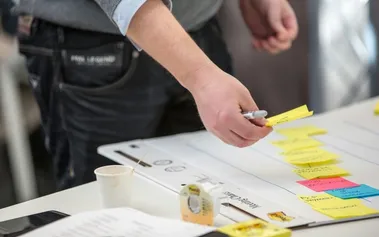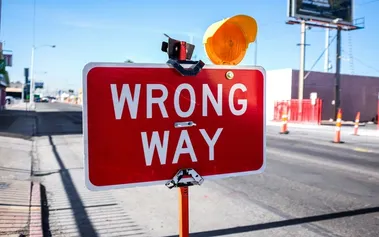The call came at midday on a Tuesday. A founder I'd been working with was on the brink of tears, their voice breaking with emotion. "My head of engineering just resigned," they said. "And my co-founder is threatening to sue me. They're saying I've failed to execute and created an environment that prevents progress. I don't understand how this happened."
This founder had been grinding for eighteen months trying to find product-market fit for their health tech startup. When progress seemed slow, they'd started micromanaging every development task. They questioned every technical decision despite having no technical background. Daily standups became interrogation sessions.
What they couldn't see was that their desperation to succeed had created exactly the problem their co-founder was describing. Their micromanagement was preventing the very progress they were trying to accelerate.
The final blow came when I learned they'd been telling investors that my involvement wasn't solving the problems effectively enough. I'd become another convenient scapegoat in their narrative of "not my fault."
This is the founder's paradox. Your unshakeable belief in your vision gets companies off the ground, but success requires evolving from "I know best" to "we know best."
I've worked with dozens of founders navigating this challenge. The ones who scale successfully learn to use what I call the "Three Yous" framework: understanding how you see yourself, how your team sees you, and who you need to become. It's the difference between building a company dependent on you and building one that thrives because of collective wisdom.
The Three Founder Identities
How You See Yourself
Most founders see themselves as strategic masterminds who understand every detail because they built it from nothing. You're the detail-oriented perfectionist, the irreplaceable decision-maker who maintains quality through hands-on involvement.
This self-image isn't wrong. It's what got you here. You probably do understand your customers better than anyone else on your team. You can spot problems others miss. Your instincts have been proven right countless times.
The ego trap emerges when this becomes your identity rather than your origin story. I've watched founders insist on approving every piece of customer communication because "nobody understands our customers like I do." They review every hiring decision, every product feature, every marketing message. They believe hands-on involvement equals quality control.
But there's a difference between being the person who built something and being the person who can best scale it. The skills that make you a brilliant founder don't automatically make you the best ongoing decision-maker for every aspect of your growing company.
How Your Team Sees You
Your team experiences a different reality. They see decisions piling up waiting for your approval. They watch themselves second-guessing perfectly good judgement because "we need to run this by the founder" has become the default response.
I worked with one founder who couldn't understand why their team seemed less innovative than when they were hired. During our session, they mentioned that ideas had to go through them for approval. "But I approve most of them," they protested. They couldn't see that the approval process itself was killing innovation. By the time ideas reached them, they'd been sanitised, simplified, and stripped of the creative risk that makes breakthrough solutions possible.
Your team stops proposing bold solutions when they know everything needs your blessing. They start anticipating your preferences rather than thinking independently. Worse, they begin to mirror your thinking patterns, creating an echo chamber when you need diverse perspectives most.
The customer impact is subtle but serious. When all decisions filter through a single perspective, you're building products based on the worldview of one person, no matter how brilliant that person might be.
Who You Need to Become
The identity evolution you need is from single point of genius to amplifier of collective intelligence. Instead of being the smartest person in the room, you become the person who makes everyone else smarter.
This doesn't mean stepping back from important decisions. It means changing how those decisions get made. Your new success metrics become team confidence, decision speed, and the diversity of solutions your organisation generates.
Another founder I worked with transformed their weekly leadership meeting from a reporting session to a problem-solving workshop. Instead of team members presenting their areas for approval, they brought their toughest challenges for collective input. The founder's role shifted from approver to facilitator, questioner, and synthesiser.
The results were remarkable. Decision speed increased, but more importantly, decision quality improved. The team started catching problems the founder missed and generating solutions the founder wouldn't have considered.
Customer-Centricity vs Founder Vision
When Founder Vision Conflicts with Reality
Your original vision was probably brilliant. But customers have a habit of wanting things you didn't anticipate, using your product in ways you didn't expect, and caring about features you thought were unimportant.
The ego trap happens when you start dismissing user feedback that contradicts your vision. I've seen founders explain away customer complaints, convince themselves that users just don't understand the product properly, or decide that customers asking for different features "aren't our target market."
The founder from my opening story exemplifies this perfectly. They were so focused on finding product-market fit that they started treating customer feedback as noise rather than signal. When early users struggled with their health tech solution, the founder's response was to blame user education rather than examine whether their approach needed adjustment. This resistance to external input was part of the same pattern that had created their internal management problems.
Building Customer-Obsessed Culture
The shift from "This is what I envisioned" to "This is what customers are telling us" requires genuine humility. You need to create systems where customer data carries more weight than founder intuition. That includes empowering customer-facing team members to influence product decisions.
Another founder started attending customer success calls not to direct the conversation, but to listen. They heard customers describing problems they'd never considered and praising features they'd thought were minor additions.
Most importantly, they watched their customer success team demonstrate understanding of user needs that surpassed their own. The revelation wasn't that they'd become less capable, but that their team had developed expertise they didn't possess.
This founder restructured their product roadmap process. Instead of starting with their vision and checking it against customer feedback, they started with customer needs and used their strategic thinking to find solutions. Their product development speed increased, customer satisfaction improved, and their team felt genuinely empowered to contribute to company direction.
The Diversity and Inclusion Mirror
Recognising Homogeneous Decision-Making
Look around your leadership team. If everyone looks like you, thinks like you, and comes from similar backgrounds, you're not building the best team. You're building the most comfortable team.
I've worked with founders who genuinely believed they hired "the best people" while consistently choosing candidates who shared their educational background, work experience, and thinking style. They created echo chambers that reinforced their existing perspectives rather than challenging them.
The customer impact is significant. If your leadership team lacks representative perspectives, you'll miss market opportunities, misunderstand user needs, and build products that work well for people like you but fail for everyone else.
Creating Space for Different Voices
Building inclusive teams requires more than diverse hiring. It requires creating decision-making processes that invite and value different perspectives. This means celebrating when team members disagree with your perspective, not just when they enhance it.
I worked with a founder who implemented "devil's advocate" sessions for major decisions. Team members were explicitly asked to identify flaws in proposed strategies and offer alternative approaches. Initially uncomfortable, these sessions became the source of the company's best strategic pivots.
The founder learned that vulnerability became a team strength. When they admitted uncertainty and asked for input, the team responded with their best thinking. When they projected confidence in potentially flawed strategies, the team stayed silent and let mistakes happen.
Research consistently shows that diverse teams outperform homogeneous ones in customer understanding, problem-solving, and innovation. But diversity only creates value when different voices are heard and valued, not just present in the room.
The Transition Toolkit
Daily Practices for Identity Evolution
Start with changing your questions. Instead of asking "What do I think about this?" ask "What are we learning?" Instead of "Here's what we should do," try "What options should we consider?"
Transform your role in meetings from decision-maker to facilitator. Ask more questions than you answer. When team members present problems, resist the urge to immediately offer solutions. Instead, ask what solutions they've considered and what additional information might be helpful.
Building Feedback Systems
Create feedback loops that help you understand how your involvement affects team confidence. One simple approach is after meetings where you've been heavily involved in decisions, ask team members privately whether they felt heard and whether they have additional thoughts they didn't share.
Regular one-to-ones should include questions about decision-making processes. Ask your team where they feel empowered and where they feel constrained. Most importantly, listen without defending when they point out areas where your involvement might be slowing things down.
Measuring Success Differently
Your new metrics should include team decision speed, the diversity of ideas generated, and trends in customer satisfaction. But the ultimate test is whether your team makes better decisions without you than with you.
This doesn't mean you're not needed. It means you've successfully evolved from being the person with all the answers to being the person who helps others find better answers than you could generate alone.
The real measure of success is when your team consistently delivers solutions you wouldn't have thought of, approaches problems from angles you'd never considered, and makes decisions that prove more effective than your instincts would have suggested. This happens when you've created genuine psychological safety and space for different thinking to flourish.
From Prison to Platform
Your vision created the company, but your evolution will scale it. The "Three Yous" framework isn't a one-time exercise. It's an ongoing practice that prevents you from becoming the limitation on your own success.
Start with regular check-ins (How do you see your role? How does your team experience your involvement? What identity do you need to develop next?). Use customer data as an objective arbiter when your assumptions conflict with market reality. Build diverse teams not as a nice-to-have, but as a competitive advantage.
Most importantly, redefine founder success. It's not about being indispensable. It's about building something bigger than yourself.
This week, identify one decision you typically make alone. Invite your team into the process. Ask for their input, consider their perspectives, and observe what happens. You might discover that your vision becomes more powerful when it's shared rather than guarded.
The goal isn't to step back from your company. It's to step up to the kind of leader your company needs to scale.
It took becoming another target in their blame narrative before I fully understood how deep their self-awareness gap was. The very pattern that had driven away their co-founder and head of engineering (avoiding responsibility and externalising fault) was now being applied to our working relationship.
The pattern of blame-shifting was so entrenched that I eventually ended our working relationship after being blamed for the continued failures. The company ultimately failed. A sobering reminder that self-awareness can't be forced from the outside, no matter how much support is offered.




